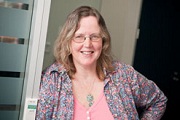Ensuring technology benefits all
Associate Professor Mary Tate’s research is focussed on making sure that technology creates benefits that are share equally across society.
Technology is advancing at a rapid rate, and while it promises to make life better it can also have the opposite effect—from driving inequality, to putting the sensitive data of everyday people at risk.
Dr Mary Tate, an Associate Professor in Information Systems at the Wellington School of Business and Government, is focussed on research that helps organisations understand, incorporate, and adopt technology in a way that benefits them and their customers, or in the case of government, a nation’s citizens.
“I like change, I like to innovate,” says Associate Professor Tate. “I’m not a business as usual person. I tend to be one of these people that’s more into disruption and innovation, so I’ve often been what you might describe as an intrapreneur—attempting to innovate within organisations.”
Before Associate Professor Tate joined the world of academia, she had an extensive twenty-year career, primarily in technology related roles. That wasn’t always her ambition though, initially doing a Bachelor of Arts in English Literature at Massey University.
“My father was the first Professor of Computer Science in New Zealand, he worked for IBM in the 1960s and then became a Professor of Computer Science at Massey so I did do a minor in technology, probably with Dad’s encouragement. I came out with this hybrid degree, mostly philosophy and English, but with a minor in computing,” says Associate Professor Tate.
After graduating, Associate Professor Tate began working for the Department of Trade and Industry as a Policy Analyst—but it wasn’t long before she shifted into tech related roles.
“In the 1980s computing was sucking up a lot of people, there was huge demand, and there wasn’t anywhere near enough grads to meet that demand,” says Associate Professor Tate. “I think someone must have found some technology papers in my university transcript, so I got pulled into some technology projects at the Department for Trade and Industry and then moved into Business Analyst type roles.”
Since gaining her PhD here at Te Herenga Waka—Victoria University of Wellington, Associate Professor Tate has published a wide range of research papers focusing on areas like e-commerce, self-service technologies, and IT governance.
One of Associate Professor Tate’s more recent research projects focuses on blockchain and the transformational impact it is having on business models and ecosystems. While many associate blockchain with Bitcoin and online financial services—blockchain technology can be used in a variety of domains including smart contracts, video games, and healthcare.
“I’ve tried to stay away from the very technical aspects of blockchain and concentrate more on the business affordances, what does it enable you to do?” says Associate Professor Tate. “What we were trying to do with our paper, The Transformational Impact of Blockchain Technology on Business Models and Ecosystems, was provide frameworks that businesses could use themselves. I’m very interested in providing tools that will help people understand the impacts of new technology and how they might incorporate them into their own business models.”
“I’m also interested in the whole issue of the trustworthiness of media, particularly once we get into deepfakes and that kind of thing. I’m interested in whether it’s possible or whether there are potential applications of blockchain to look at the provenance of information. But that’s just a gleam in my eye at the moment,” she says.
The impact of emerging technologies, such as artificial intelligence, on privacy, security, and the stigmatisation of people is also an important focus for Associate Professor Tate.
“Targeting and stigmatisation are so close together they’re extremely difficult to pick apart and that’s a very big risk with AI,” she says. “There are so many data points that are captured about people and our digital footprints are so big that there can be a very fine line between targeted assistance and stigmatisation.”
To help combat this, Associate Professor Tate believes people need to be upskilled, so they can fully understand the impact new technologies can have.
“We need advocacy groups with skills, we need people with skills to give their time to advocacy groups, we need citizen spokespeople and groups to keep governments and organisations honest and it’s not easy since technologies are running way ahead. Even when you describe things to people they say its science fiction and it’s not. So, we need much wider consultation and discourse with people about all these things and more ownership and engagement. It’s a tough ask,” she says.
Going forward, Associate Professor Tate hopes her research will play a role in making sure technology benefits everyone equally, not just an elite group.
“The very rapid pace of change at the moment is creating particular problems in the public sphere. I’m also quite worried about the increasing gulfs in income between the richest and poorest people and technology is driving quite a lot of that,” says Associate Professor Tate. “What I really want to do is make sure that technology creates benefits that are shared more equally and does deliver useful services to people, that it enables governments to engage with and serve their citizens more effectively.”
“I’m not really confident that the trajectories where on at the moment are all for good and so, to the extent I’m able to be part of those conversations, I’d like to try and even that out a little bit and allow ordinary people to benefit from these exciting things that are happening at the moment.”
Associate Professor · Deputy Head of School
School of Information Management

